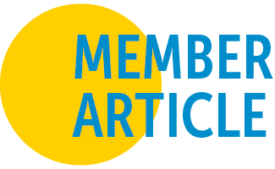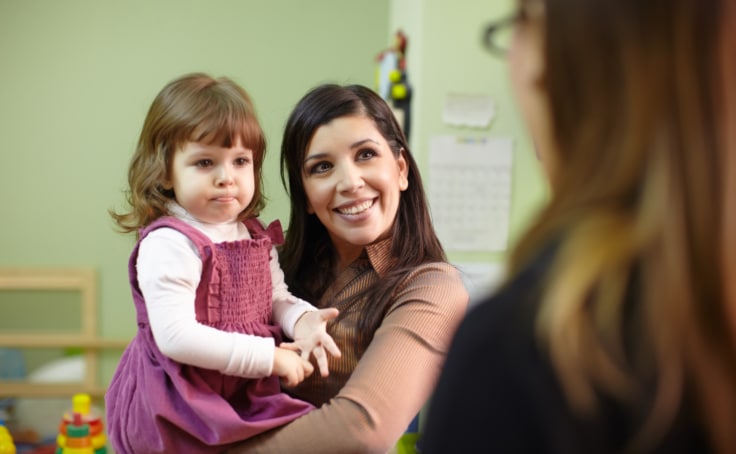
From Reflection to Revolution: Leadership in the IECMH Field


The 2025 IECMH Emerging Leadership Awardees reflect leadership rooted in relationships, humility, and a long-term vision for change.
Dr. Diana Morelen blends reflective science with compassion, aiming to turn knowledge into tools for healing. Dr. Janina Fariñas leads with cultural affirmation and ancestral wisdom, sparking intergenerational healing and collective action. Sarah Barclay Hoffman champions policy change grounded in equity, lifting up paraprofessionals and peer leaders. Together, they honor the past, stay grounded in the present and build a more just, connected future for children and families.
If you could go back in time to when you first entered the IECMH field, what is one piece of professional advice you’d give yourself?
“Dear Diana,
You have the heart of a helper and the mind of an overachiever. Be kind to yourself, young one. Seek out rituals, routines, and relationships that nurture your roots. And practice patience. Change takes time. Choose quality over quantity.
The more time you spend in nature, the healthier you will be. The more time you spend in mindful reflection, the healthier you will be. If you combine mindful reflection and nature, the benefits will be felt exponentially.
Remember that rest and play are essential nutrients. Don’t wait until your body or mind hollers; listen to the whispers that urge you to slow down.
FYI: Not all folks trust science, and reflective practice can feel countercultural.
Finally, real self-care and radical love are concepts and practices that will transform you. Find them sooner if you can.”
I would tell myself: “No matter what distractions come along, remember who you are, and keep walking, Janina.”
After all, changemaking is slow-burning, warmth-giving, life-affirming, and relational fire. What lies ahead is a 500-year journey — long, steady, and always unfinished.
As others try to define you, or when the intelligent function of doubt arrives, pause — and remember who you are. Stay close to the babies, parents and communities whose voices are always clear. Healing isn’t linear. Make new paths when necessary, always pass the torch to others — multiples of others, and keep going.
Prioritize progress over perfection.
When I first entered the IECMH field, I came from another policy content area. Early on, wanting to demonstrate my competency resulted in too much time spent working to perfect a proposed policy solution, paper, or product.
High standards, attention to detail, and inclusive processes are important —and — impact and progress occur from doing, obtaining feedback, and learning. Again and again and again.
Particularly with policy and systems work, the conditions are rarely perfect, and policy change is often incremental. Generating ideas and being comfortable with advancing “good enough” moves the needle.
If we want our babies to grow up to be happy and healthy, we need people, programs and policies that support babies, their developing brains and the caregivers who are raising them.
Dr. Diana Morelen
How do you define leadership in your work?
To me, effective leadership in IECMH research is reflective leadership. It is a way of being that is values-driven and rooted in relationships. I believe the best science requires humility, patience, and acceptance that it is often through our failures that we learn the most. I seek to conduct research that balances scientific methodology with humanistic ideology. Or, perhaps more simply stated, I am a curious scientist mixed with a compassionate healer who believes all humans are worthy of love and capable of growth.
I use science to help children, families, and service providers experience safe, stable, and nurturing relationships and to help system leaders and policy makers see the importance of investing in IECMH programming. This is no small task, and I have not arrived here alone. My success is rooted in the breadth and depth of relationships with reflective colleagues, loving kin, and caring community.
As a Latina with intersecting identities, I define leadership in IECMH as the responsibility to invite all Latines to heal across generations. It is like being the spark for a fire that already longs to burn — once lit, tending it in ways that create warmth and draw others to gather around.
Rooted in humility, cultural affirmation, and a collective vision for liberation, leadership means showing up again and again to honor the wisdom that has emerged, is emerging, and will continue to emerge.
This kind of leadership becomes a long-burning fire — one that seeks to transform systems and fuel change for hundreds of generations to come.
We need policies at all levels and dimensions to support IECMH, and the safe, stable, and nurturing relationships and environments which infants, toddlers, families, and caregivers need to flourish.
Leadership in IECMH policy is using your knowledge, power, and time to equitably inform and advance policy change. Policy leadership is for everyone! If you are passionate about families, the economy, health, education, or public safety — all of these issues and more can be linked to IECMH policy.
Opportunities to influence IECMH policy are everywhere. Policies are found in our workplaces, houses of worship, and civic organizations — as well as in our federal and state laws, regulations, and budgets. Everyone can lead from where they are — leadership does not require authority or a title.
Finally, IECMH policy leadership centers the expertise of those most impacted, and those who have historically been excluded from shaping policy. When each person claims a policy leadership role, our world’s babies and families thrive.
I believe infant and early childhood mental health is the most important gateway to a better future for Latina families, so my work is to ensure the gate is wide open for all families.
Dr. Janina E. Fariña
If you traveled into the future five years, what is one professional achievement you hope is checked off your list?
I have spent most of my life seeking knowledge to help me be a better helper, and I find great joy in sharing what I’ve learned. From parenthood to professor–hood, there are core beliefs, strategies, and skills on which healthy relationships are built.
I dream of writing many books that help others slow down and build skills to be kinder humans — toward others and ourselves. It feels scary to move outside the box of academic writing, yet I deeply long to share what I’ve learned in ways that are accessible and relatable.
My “How to Human” dream book series has already started to take form —— from an advice column in my local newspaper to a soft launch social media campaign in which I share how I walk the walk (or, more so, stumble through the practice) of how to be a caring human. Stay tuned for more.
That I was that spark — one of many who ignited thousands of Latine IECMH leaders to also see themselves as sparks, essential to the future of our field.
And that by reading this, other Latine professionals recognize themselves not only as leaders, but as changemakers — grounded in community-centered actions, a deep sense of belonging, and the healing power of us — together.
My hope is that in that togetherness, we redefine who gets to lead in IECMH — not as a solitary act, but as a collective, sustainable, intergenerational practice. And that this wave of leadership brings us closer to what matters most: babies held with collectively stronger arms, families seen and valued, and communities resourced to heal together.
I hope to have contributed towards improved policies and financing of the infant, early childhood, and family mental health non-clinical workforce. This includes an emphasis on community health workers who have training in perinatal and/or IECMH, therapeutic models that incorporate or center peer support, and interventions that can be deployed with trained paraprofessionals.
Work in this space honors and builds on the many leaders who have fought for systemic recognition of the value and expertise provided by peers, parents, and paraprofessionals. Expanding the IECMH workforce to sustainably and equitably include a wide variety of peers and paraprofessionals can afford families more opportunities for culturally attuned and responsive care, mental health promotion, condition prevention, and healing through relationships.
I’m looking forward to reporting back on the progress in five years!
At a budget hearing, a parent spoke about HealthySteps and how it was immensely helpful to their family, and a legislator took notice. For me, that was full circle.
Sarah Barclay Hoffman
Related Resources

